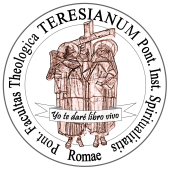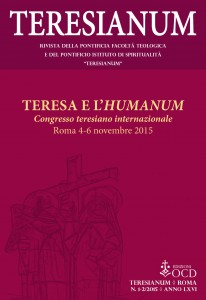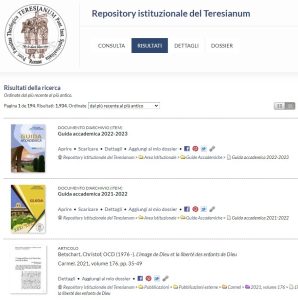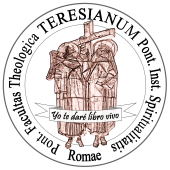1. The Licentiate Degree Course in Theological Anthropology comprises a biennium dedicated to the study of fundamental subjects, as well as optional monographic or short courses, to be chosen according to preference, direction of specialism and seminaries. An examination De Universa and a Dissertation for the Degree will conclude this phase. The plan of studies entails 120 ECTS minimum.
2. Inscription requires “the title of Bachelor’s Degree in Theology or the equivalent obtained in a theological faculty” (Statute, art. 76a) “with an average mark of not less than 8/10, 24/30 or equivalent, according to the relevant marking system. Where the mark was below this level, the President may require that the candidate pass an admissions examination” (Statute, art. 46a) in the presence of two professors.
Candidates who have completed first level (undergraduate) studies in Theology in ecclesiastically recognised institutions, but who do not have a Bachelor’s degree, may enter upon the two-year specialisation (Licentiate), on condition that they have engaged in an equivalent course of studies, have obtained an average mark of not less than 8/10, 24/30 or equivalent, according to the relevant marking system (cf. Statute, art. 46b), and have passed the admissions examination in the presence of two professors. In the case of a negative result, the candidates “must engage in one or more semesters of the first level (undergraduate), in accordance with the established programme, and then repeat the examination” (Statute, art. 46b).
3. Ten years after the initial enrollment as an undergraduate student on the Degree Course, the right to continue studies will end.
4. In addition to knowledge of the Latin, Greek and Italian languages, one of the following modern languages is required: French, Spanish or German (cf. Statute, artt. 46d; 76b). For more detailed information in regard to this, consult the section “Studiare – Lingue moderne”.
5. The project for the Degree Dissertation, agreed with the Moderator, must be submitted to the General Secretariat no later than the end of May in the first academic year of the biennium. The project must include: the subject of the Dissertation, a resumé and a basic bibliography. It should not have been presented previously in any other Academic Centre.
The Moderator for the Degree Dissertation is chosen by the student from among the professors of the Teaching Body, whilst the examiner is designated and named by the Executive Committee, from among the Faculty professors.
Exceptionally, a professor from another ecclesiastical or civil faculty may be named by the Executive Committee as examiner.
Professors who have ceased to be in post (cf. Statute, art. 41) cannot be Moderators. Emeritus professors may complete their commitment as Moderators, if appointed before their new status took effect.
For emeritus professors, the duties as Moderator and Examiner are subject to approval by the Chancellor, following a proposal made by the advisory body of the Faculty (cf. Statute, art. 41b).
Once three years have passed since approval of the plan of the Degree Dissertation, the student loses the right to proceed in that particular research area, except in cases where the Dissertation remains free, in other words, the subject matter has not been approved for another student.
The Degree Dissertation -comprising a minimum of 60 and a maximum of 120 pages- signed by the moderator, should be Submitted to the General Secretariat. There should be three paper copies hard bound, as well as an electronic copy to be sent as a PDF, before the due date for that academic year. At the same time, a declaration with regard to the originality of the text and the conformity of the PDF with the written text, as per the model available on the Faculty’s web page.
6. For the presentation of the Degree Dissertation, as well as any other written tasks, bear in mind the general norms required when editing research work (available on the Faculty’s web page).
7. With regard to the enrollment procedure for the examination De Universa, it is only possible to enroll three times in the period of three successive years after the conclusion of the course.
The Examining Committee for the examination De Universa comprises two professors who together, proceed to examine the candidate. The Viva voce examination De Universa lasts one hour.
In the first ten minutes the candidate will set out the Degree Dissertation, following the lines of a written text which will be submitted to the professors at the beginning of the examination, after which the professors can formulate relevant questions (ten minutes).
The written text for the presentation of the Degree Dissertation should not exceed two pages and should include the following points:
a) name and surname of the student, title and subtitle of the dissertation;
b) a brief resumé of the same (10-15 lines).
c) a detailed plan of the viva presentation. It is advisable to include quotations and the main results of the research in the plan (formulated synthetically).
The student must take three copies of this text with him (one for his presentation and two for the professors). The final mark will take this written text into account. In the 40 minutes remaining of the examination, the professors will proceed to examine the candidate on the chosen aspects of the Thesis.
The official language for the examination De Universa is Italian; other languages may be accepted at the discretion of the Examinations Board.
8. The biennium concludes with the conferring of the Bachelor Degree or Master’s Degree (Specialist Laurea) in Theology with Theological Anthropology as a specialization, according to the studies engaged in by the student (cf. Statute, art. 89a).
Marks awarded for said qualifications are as follows:
1/3 – median achieved in the biennium;
1/3 written Dissertation;
1/3 a Viva voce examination De Universa.
Class schedule
From Monday to Friday 08.30-12.55. Some lessons can be held in the afternoon (15.30-18.50).
The Second-Cycle Student must take the following coursework for a minimum of 120 credits ECTS in the two years of the License Degree:
| Required courses | 39 ECTS |
| Optional courses | 36 ECTS |
| Required seminars | 8 ECTS |
| Optional seminar | 4 ECTS |
| Conferences and study days | 3 ECTS |
| Exam De Universa | 10 ECTS |
| Licentiate Dissertation | 20 ECTS |
Corsi prescritti
1. Metodi
| SP1002 | Metodologia del lavoro scientifico | 5 ECTS |
2. L’uomo come questione
| AP1021 | Questioni antropologiche del mondo odierno | 5 ECTS |
| AP1330 | Antropologia psicologica | 3 ECTS |
3. Il contributo cristiano
Corsi opzionali
| Nel biennio vengono proposti diversi corsi opzionali. Un corso opzionale può essere sostituito dalla partecipazione a due Settimane di Spiritualità. | 36 ECTS |
Seminari prescritti
| AS1000 | Seminario di antropologia teologica – lettura di testi classici | 4 ECTS |
| AS1010 | Seminario di antropologia teologica – lettura di testi contemporanei | 4 ECTS |
Seminario a scelta
| Ogni Studente sceglie un seminario per il biennio. | 4 ECTS |
Conferenze e giornate di studio
| Lo Studente è tenuto a partecipare nel biennio ad altre attività didattiche offerte dalla Facoltà o da altre Istituzioni accademiche, scelte liberamente tra la Settimana di Spiritualità al Teresianum, conferenze, seminari, giornate di studio, simposi, convegni e previamente approvate. Per ottenere l’approvazione, lo Studente deve presentare in Segreteria Generale la richiesta scritta con la giustificazione accompagnata dal Programma dell’evento, almeno una settimana prima. L’approvazione comporterà le indicazioni riguardanti la sintesi personale o eventualmente altro tipo di lavoro che lo Studente sarà tenuto a fare in seguito alla partecipazione all’evento (da consegnare in Segreteria Generale entro un mese dopo l’evento), nonché il valore degli ECTS attribuito all’iniziativa. In ogni caso sarà necessario presentare alla Segreteria Generale il Certificato di partecipazione. | 3 ECTS |




